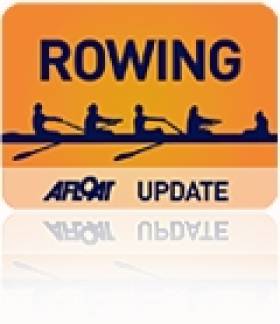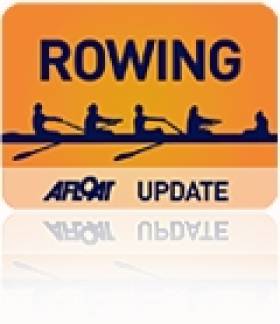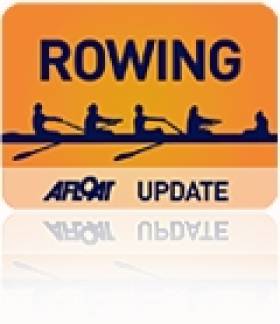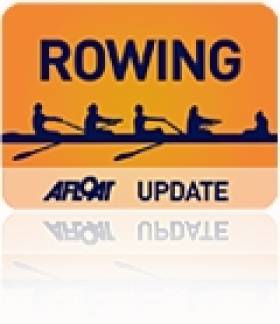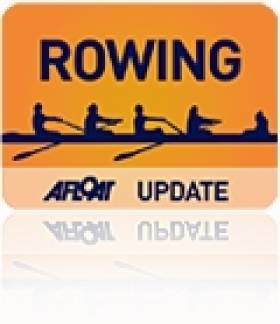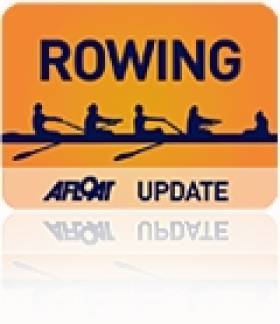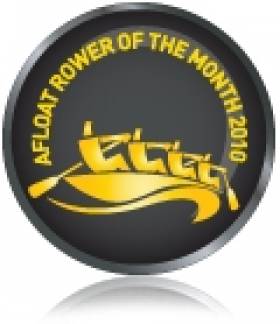Displaying items by tag: Henley
Commercial Test California To the End at Henley Regatta
#HenleyRegatta – California Rowing Club beat Commercial by one and a quarter lengths in the Prince Albert for quadruple sculls at Henley Royal Regatta this morning. The big American crew flew into an early lead: they were in front by half a length at the quarter-mile mark and one length at the Barrier. But Commercial, rating higher for most of the course, stayed just one length behind until the enclosures, when California squeezed the lead out to their winning margin of one and a quarter lengths.
Commercial were the final Irish club crew to be involved in Henley this year.
Henley Royal Regatta, Day Three (Irish interest)
Prince of Wales Cup (Quadruple Sculls, Intermediate):
California Rowing Club bt Commercial, Dublin 1 ¼ l, 6:42
Belfast Boat Club Rowers Fall To American Opponents
#RowingHenley: Belfast Boat Club led early on in their race against Union Boat Club in the Britannia Cup at Henley Royal Regatta, but the heavier crew from America came through to win well at the end. Union BC were the selected (seeded) crew.
Henley Royal Regatta, Day Two (Irish interest)
Temple Cup (Eights, Student): St Petersburg University, Russia bt University College, Dublin 2 ½ l 6:51
Visitors’ Cup (Four, Intermediate): Harvard A bt University College, Dublin 2l, 6:56.
Prince Albert (Coxed Fours, Student): Isis Boat Club bt Trinity College, Dublin 1 ¼ l, 7:27
Britannia (Coxed Fours, Club): Union Boat Club, United States bt Belfast Boat Club 3l, 7:29
Prince of Wales: Commercial, Dublin bt Poplar Blackwall and District Rowing Club and Anglia Ruskin Boat Club 1 ¾ l, 7:20
Commercial Open With Good Win at Henley Regatta
#RowingHenley: Commercial gave the Irish something to cheer at Henley Royal Regatta. The Prince of Wales quadruple of Fionnan Groome, Albert Maher, Colm Dowling and Michael Maher beat the London crew Poplar Blackwall and District RC and Anglia Ruskin BC despite trailing in the early stages. The Irish were a heavier and a better crew and had the race won before halfway.
UCD’s experienced crew in the Visitors’ Cup fell to Harvard in a disappointing race. Harvard got in front early on and stayed there all the way to the finish, where they had two lengths to spare. The Harvard crew were over a stone a man lighter. They were stroked by Andrew Holmes, an Englishman, and the crew was completed by two Australians and a New Zealander.
Henley Royal Regatta, Day Two (Irish interest)
Temple Cup (Eights, Student): St Petersburg University, Russia bt University College, Dublin 2 ½ l 6:51
Visitors’ Cup (Four, Intermediate): Harvard A bt University College, Dublin 2l, 6:56.
Prince Albert (Coxed Fours, Student): Isis Boat Club bt Trinity College, Dublin 1 ¼ l, 7:27
Prince of Wales: Commercial, Dublin bt Poplar Blackwall and District Rowing Club and Anglia Ruskin Boat Club 1 ¾ l, 7:20
Trinity Rowers Go Out After Fine Race at Henley Regatta
#RowingHenley: UCD’s Temple Cup eight and Trinity’s coxed four in the Prince Albert Cup were both beaten at Henley Royal Regatta today. Trinity gained the lead in their race against Isis and held them off manfully until the enclosures, when Isis pushed and gained control before the finish. UCD were less competitive against the bigger crew from St Petersburg in Russia, who were a stone heavier per man. The pattern of the race was established early as the Russians took the lead by the end of the Island. They had a commanding lead by Fawley and won by four lengths.
Henley Royal Regatta, Day Two (Irish interest)
Temple Cup (Eights, Student): St Petersburg University, Russia bt University College, Dublin 2 ½ l 6:51
Prince Albert (Coxed Fours, Student): Isis Boat Club bt Trinity College, Dublin 1 ¼ l, 7:27
UCD Continue Good Irish Run at Henley Royal Regatta
#RowingHenley: UCD had a convincing win over University of Bristol in the Temple Cup for student eights at Henley Royal Regatta. UCD, with a higher rating, got an early lead. By the Barrier they had a clear water advantage and they were able to ease down the rating and come home with no extra energy expended. They won by four lengths.
Henley Royal Regatta, Day One (Irish interest)
Temple Cup (Eights, Student): UCD bt University of Bristol 4l, 6:57
Prince Albert (Coxed Fours, Student): Trinity College, Dublin bt University of Virginia A ¾ l 7:24.
Tough Draws for Irish Club Crews at Henley Regatta
# ROWING HENLEY DRAW: Irish club crews have been given some tough draws for Henley Royal Regatta, which begins on Wednesday. Three of the five have drawn selected (seeded) crews: UCD’s strong Visitors’ Cup four will face Harvard A; Belfast Boat Club take on Union Boat Club of the United States in the Britannia and Trinity face the might of University of Virginia in the Prince Albert for student fours. The two exceptions are in the Prince of Wales, where Commercial take on PB and DRC and Anglia Ruskin and the Temple Cup where UCD are drawn against University of Bristol.
Henley Draw (Irish interest)
Temple Cup (Eights, Student): UCD v University of Bristol
Visitors Cup (Fours, Intermediate): UCD v Harvard A (selected crew)
Prince of Wales Cup (Quadruple Sculls, Intermediate): Commercial v PB and DRC and Anglia Ruskin
Britannia (Coxed Fours, Club): Belfast BC v Union BC (US) (selected)
Prince Albert (Fours, Student): Trinity v University of Virginia (selected)
Double Sculls (Open): R Chambers, P Chambers (selected) v winners of Knight and Bell and Mole and Fisher in quarter-final
Diamond Sculls (Single Sculls, Open): A Campbell (selected) v winner of GP Bozhilov and DS Read in quarter-final
Portora/Ireland Quadruple are Rowers of Month
The Rowing Ireland/Portora composite which won the elite quadruple sculls at Henley Women’s Regatta are the Afloat Rowers of the Month for June. The crew of Eimear Moran, Lisa Dilleen, Holly Nixon and Sanita Puspure beat a British combination crew in the final by four lengths. Dilleen and Puspure had earlier won the elite double sculls.
Rower of the Month awards: The judging panel is made up of Liam Gorman, rowing correspondent of The Irish Times, President of Rowing Ireland Anthony Dooley and David O'Brien, Editor of Afloat magazine. Monthly awards for achievements during the year will appear on afloat.ie and the overall national award will be presented to the person or crew who, in the judges' opinion, achieved the most notable results in, or made the most significant contribution to rowing during 2011. Keep a monthly eye on progress and watch our 2011 champions list grow.
Irish Rowing News. Rowing Clubs, Regattas, Sculling & Coastal Rowing
Afloat's rowing coverage encompasses the widest range of activities undertaken on Irish lakes, rivers and coastal waters. We aim to bring jargon free reports separated in to popular categories to promote the sport in Ireland.
Click this link for the latest Irish Rowing News and Results.
Rowing is one of the oldest of all sports, and FISA (Federation des Societes d'Aviron) the governing body of the sport, which was founded in 1892, is the oldest international sports federation in the Olympic movement. FISA has 128 member federations worldwide, organises World and Olympic Championships and World Cups and promotes all forms of rowing – including the non-Olympic event of Coastal Rowing.
The Irish Amateur Rowing Union, a federation of rowing clubs, has a history almost as long as the international body: it was founded in Dublin in 1899. Now reconstituted as Rowing Ireland, in 2010 the union had 69 affiliated clubs spread throughout the island of Ireland and 2,500 registered athletes. The National Rowing Centre is based at Farran Wood on Inniscarra Lake in County Cork. The domestic season traditionally culminates in the National Championships in mid-July.
Rowing is divided into sweep rowing and sculling. Sweep rowing involves the participant using both hands on one oar; in sculling the participant holds one oar in each hand. Boats may include a cox (coxwain), who generally steers the boat by means of wires, and guides and rallies the crew. In the shorthand of the sport, coxless crews are denominated by a minus (e.g. a men's coxless four is M4-). Senior sculling crews generally do not include a cox. The set distance for competition in regattas is 2,000 metres. Six-lane racing is standard.
The Olympic Games are the highest level at which rowers compete: there are 14 Olympic rowing classes, eight for men and six for women. Only three of these are in the lightweight classification, the most successful one for Irish rowers: men's fours (LM4-) and double sculls (LM2x) and women's double sculls (LW2x).
Individual oarsmen in lightweight crews cannot exceed 72.5 kilograms, and the average weight of a lightweight crew, excluding the cox, cannot be over 70 kgs. A single sculler cannot be above 72.5 kgs. The equivalent for women are 59 kgs (highest weight) and 57 kgs (average for oarswomen in a crew).
Ireland's best results at the Olympic Games came in 1996 and 1976. At Lake Lanier in the 1996 Games the men's lightweight coxless four crew of Tony O'Connor, Neville Maxwell, Sam Lynch and Derek Holland were beaten by less than a second for the bronze medal. In 1976 in Montreal Sean Drea finished fourth in the men's single sculls. In 2004 the Ireland lightweight four finished sixth in Athens.
The annual World Rowing Championships feature the 14 Olympic events and eight others for able-bodied athletes along with four adaptive events. The Championships have been a much happier hunting ground for the Irish, especially in the non-Olympic events. Niall O'Toole won gold in the lightweight single scull in 1991 and in 2001 Ireland won three World Championship golds: Sam Lynch (lightweight single scull); Sinead Jennings (women's lightweight single) and Tony O'Connor and Gearoid Towey (lightweight pair). Lynch sucessfully defended his title in 2002.
After the Olympics and the World Championships, the third big rowing competition is the World Cup series, usually three regattas in Europe. The World Under-23 Championships, the World Junior Championships, and, for countries in these islands, the Home Internationals, are also big international events. The European Championships were revived in 2006 after a three-decade break and Ireland took part in 2010.
Henley Royal Regatta, with the finals in July each year in the English town, has a special place in the calendar due to its history and its social aspect.
Our coverage though is not restricted to the Republic of Ireland but encompass Northern Ireland Scotland, Wales and the Irish Sea area too.
We're always aiming to build on our rowing content. We're keen to build on areas such as online guides on rowing. If you have ideas for our pages we'd love to hear from you. Please email us at [email protected]




























